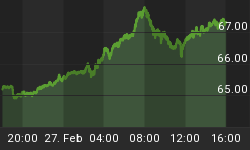Common sense tells us something typically changes as stocks shift from a bull market to a bear market, meaning people need a reason to say "I am getting out." Gluskin Sheff's Chief Economist & Strategist, David Rosenberg, highlights the two big historical bear market triggers. From Business Insider:
"For stocks, it always comes down to the Fed and the economy. The reality is that bear markets do not just pop out of the air. They are caused by tight money, recessions, or both."
Fear Eventually Turns Into Deflationary Fear
As noted in "Is The Smart Money Running For Cover?", bear markets tend to be deflationary and fear-based events, which eventually triggers demand for defensive-oriented bonds. Therefore, looking at hard data from the bond market can help with the assessment of recession probabilities.
2007 Recession Odds
The Wall Street Journal recently published the two recession probability charts below. The first one tells us the odds of a recession, based on hard data, were sitting at roughly 40% in late 2007. Was the hard and observable data helpful? Yes, the S&P 500 dropped from 1468 on December 31, 2007 all the way down to the intraday low of 666 on March 9, 2009. The hard data was in hand before stocks dropped an additional 54%.

2015 Recession Odds
How does the exact same chart, on the exact same scale, look in 2015? Answer: much better.

Investment Implications - The Weight Of The Evidence
The relatively low probability of a recession aligns with numerous other forms of hard data as outlined in "Are Stock Correction Odds Increasing?". Could it be different this time? Sure, it could be, but fear is fear and eventually it has to start showing up in the hard data. A shift toward fear could start tomorrow, but under our approach we need to see it, rather than anticipate it. Remember, the data was waving red flags in late 2007 before stocks plunged an additional 54%, no anticipation was necessary. The point of the exercise is to look at historical data and 2015 data, rather than play the "but, what if" game, which can always be played under all market conditions.















